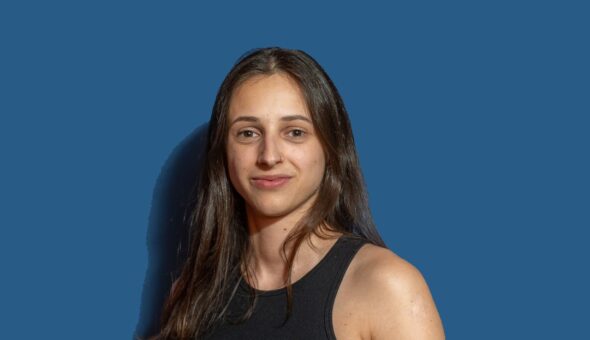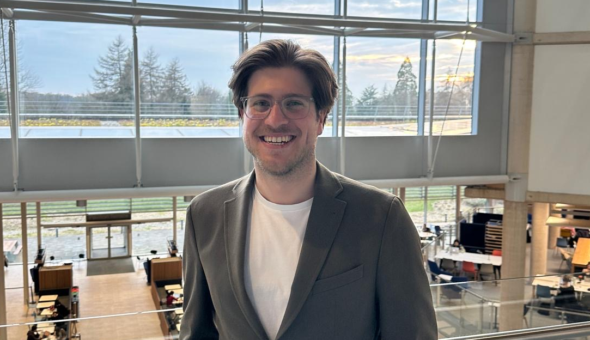Elif is at the end of her fourth year of her PhD, studying the working lives of female refugee communities in the Global South. She tells us about the agency of silence, addressing gendered stigma and the refugees’ persistence in living honourable lives.
What drove you to choose Bath for your PhD?
I wanted to focus on the working lives of Syrian refugee women who became domestic workers in Turkey after fleeing from the Syrian war. I found that the School of Management is highly interdisciplinary, with many scholars researching fascinating subjects.
I reached out to my supervisor, Professor Nancy Harding, after discovering her innovative work on gender and identity, which combines philosophy and sociology. My second supervisor, Dr Deborah Brewis, was also interested in working with female refugee populations, as she focuses on critical theory and identity.
I wanted to work with these excellent scholars, so they and Bath’s University Research Studentship Award led me to do my PhD here.
What is your research topic and how did you decide on it?
I explore how Syrian women, who once led comfortable lives in Syria but were forced into exile by war, strive to protect their honour and dignity but are now compelled to take on doubly stigmatised work to support their children.
I completed my master’s in political science with a focus on anthropology, and I also studied political science as an undergraduate. Since the beginning of my BA in 2010, I have been actively involved in NGOs, organising human rights workshops as well as policy-focused symposiums and conferences. I believe all of this led me to pursue this topic.
What initially sparked your interest in the topic?
After completing my MA, I started working for an international NGO focused on education, which gave me the opportunity to work in Kabul, Afghanistan, in 2018. I believe this is where my interest in how people live in conflict-prone areas and experience displacement deepened.
I had Afghan colleagues in our branch whose wives and children had to live in the countryside with their parents, and whenever we heard the sound of a bomb, they would call their families. I think it was being there and witnessing these moments that drove me to work on this topic.
I became interested in understanding how people flee war, find themselves in a completely strange country, and then make a living there – especially as women who lost their husbands, homes and livelihoods, and who were themselves sometimes tortured and imprisoned.
As a feminist, I became deeply interested in refugee women's lives and wanted to explore how they rebuild their lives from scratch in Turkey.
What are your findings so far?
I have worked with 76 refugee women throughout my ethnography, which I conducted between 2021 and 2022. In mainstream refugee studies and in the media, refugees are portrayed as passive individuals devoid of agency.
In my research, I’ve found multiple forms of agency that refugee women enact, even in the seemingly impossible situations they face after fleeing war with their children and arriving in a strange country. They refuse to be identified as ‘refugees’; they perceive themselves as ‘honourable’ women, and they make significant efforts to protect their own and their children’s dignity. When they construct themselves as workers, they do so in a way that allows them to maintain their honour, dignity, culture, religion and values.
For instance, in my first paper, I find out how these women practise agentive silences to enable them to feed their children while carrying out stigmatised work that could destroy their honourable identity. Domestic work is heavily stigmatised in the Syrian community, yet it is the only type of work available for these women. If they perform this work, they risk becoming dishonourable women; if they don’t, they cannot feed their children. I explore how women resolve this complexity through agentive silence, which allows them to work while maintaining their honourable identity.
In my second paper, I examine the resistance these women enact – they refuse to be identified as refugees and reject the cultural stigma, and employ micro resistances. While doing this, I also interviewed employers who hire them. So, in my third paper, I will explore employer subjectivity in the Global South.
What are the real-world implications of your research?
We are currently facing the largest humanitarian catastrophe since World War II. There are 117 million forcibly displaced people globally, including nearly 38 million refugees – most of whom are from Syria, Afghanistan, Venezuela, South Sudan and Ukraine.
85% of these refugees are hosted by countries in the Global South but most studies of refugees are of those living in the Global North.
Through my research, I aim to amplify the voices, silences, feelings and experiences of Syrian refugee women, bringing them to the forefront of public consideration with the goal of contributing to improvements in their living and working standards. I especially interrogate what the identification of ‘refugee’ brings to their lives, with its political, economic and sociological connotations.
One of my primary goals with my research is to contribute to the understanding of ‘refugees’. I ask questions such as: how can we see them as humans, friends, sisters, and brothers rather than as refugees or numbers? I believe we need to push hard for this.
What advice would you offer to others studying or considering a PhD?
A PhD is a long but very rewarding process. I’d recommend choosing a topic you're passionate about. Having supervisors who share your excitement is key – because that excitement is what takes you to your desk over four or five, years especially if you are doing qualitative study.
Our PhD office provides a bright, productive, and inspiring environment and the School is home to very successful and innovative academics. Bath is a great and very supportive place to study: join us!
Respond



